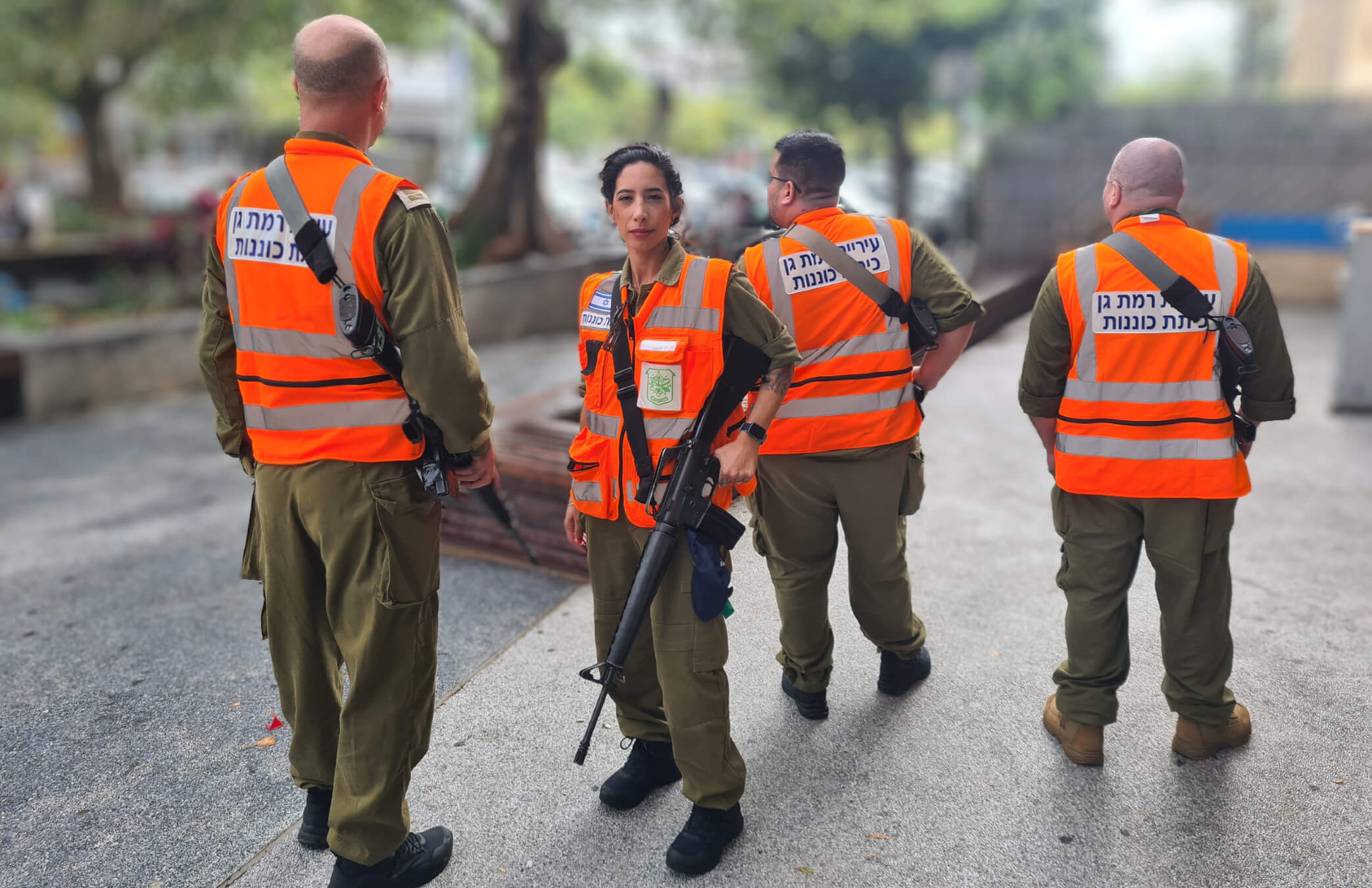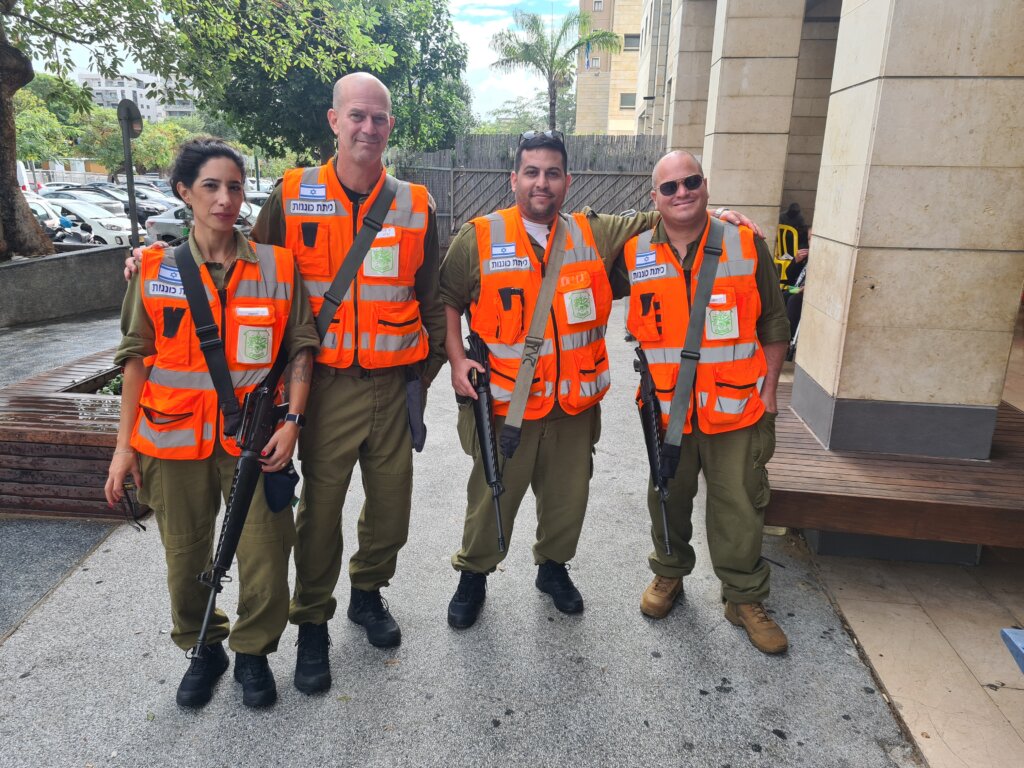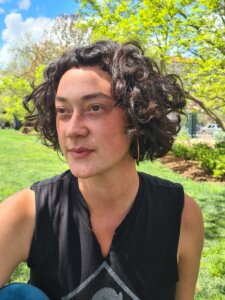In Israel, armed neighborhood-watch groups proliferate since Oct. 7
Civilians are also rushing to purchase guns, easing fear for some, and worsening it for others

Graphic by Angelie Zaslavsky
RAMAT GAN, Israel — Within 10 minutes of setting out on his patrol shift, Gal Samionov, ordinarily a project manager for a tech company, was approached by a woman walking her dog.
“Every time that I see you guys, I’m happy,” she said.
As we wound through this city of 170,000 people east of Tel Aviv last week, there were a dozen similar interactions over two hours. A man getting out of his car grasped Samionov’s hand and greeted him with an exuberant “Good evening, king!” A shop owner called out to offer a cool drink as we passed, and Samionov, who is 34, left with a bottle of water and two chocolate candies.
Then there was the disheveled man with the stained-yellow beard who started chanting a Hebrew psalm for times of distress as we passed. Samionov leaned in to join him as if the two were sharing a microphone. “Hinei lo yanum, v’lo yishan,” which means the guardian of Israel doesn’t rest or sleep.
Samionov, who now leads a 20-person division within the patrol group, is one of 80 former Israel Defense Forces soldiers who are back in uniform this fall not as part of the country’s massive call-up of reservists, but as part of Ramat Gan’s new armed neighborhood watch group.
The Israel Defense Forces would not say how many such pop-up patrol units — known as Bnei Hamakom, Hebrew for “sons of the place” — it has created to support the national Home Front Command since Oct. 7. The Israel Police counted 700 similar units across the country as of Nov. 9, up from 89 before the war.
The Home Front Command — the civilian defense arm of the IDF — issues members of its Bnei Hamakom units a rifle and field dress uniform and a paycheck comparable to what they would earn if they were deployed as reservists. In Ramat Gan, the municipality adds to that shoes, rain gear, flashlights, stipends for food and gas while on shift, and a reflective orange vest.
Those vests have come to symbolize security for Israeli Jewish residents as they slowly return to their daily routines after Oct. 7.
“When we started going out, with the orange vest and with the guns,” said the unit’s commander, Ronen Shmiel, “you enter a public park and see everyone’s sigh of relief.”
The new security patrols are part of a broader rush by Israeli civilians to arm themselves since the terror attack on Oct. 7 in which Hamas killed some 1,200 people and kidnapped another 240. Itamar Ben-Gvir, the far-right national security minister, loosened the requirements to own weapons as the war started, and as of Nov. 26, the government had received 256,000 requests for gun permits, up from 42,000 in all of 2022 and 20,000 in 2021.
(As of the end of November, the ministry had issued 44,000 “conditional permits,” a prerequisite for the training required at a shooting range, and 26,000 licenses.)
In neighboring Tel Aviv, some activists and politicians have voiced concerns about the increase in gun ownership and the new patrols. One city council member said at a public hearing that the patrol units create panic, not security, especially for Palestinians who live in Jaffa and South Tel Aviv, home to many African asylum seekers. Another posted a picture on social media of a far-right activist who is a member of a patrol unit at the gates of a local school with his weapons.
“Dozens of parents contacted me out of concern for the way he is holding the gun,” she wrote, “and the way it made the kids feel.”
Such concerns were ignited anew over a week ago when an off-duty soldier fatally shot a civilian he mistook for a terrorist while they both were trying to stop a deadly attack by two Palestinian men at a Jerusalem bus stop. Asked about the incident at a news conference the following night, Prime Minister Benjamin Netanyahu said the benefits of having more guns in civilian hands outweighed the risks.
“It may be that we’ll pay a price for it,” Netanyahu said, “but that’s life.”
‘You just don’t trust anyone anymore’
Before Oct. 7, Ramat Gan was not seen as a high-risk location of the Israeli-Palestinian conflict. Though a rocket fired from Gaza killed a resident of the town during the 2021 flareup between Israel and Hamas, it is generally quiet. Now, though, residents are newly worried about the occupied West Bank, just over a mile away.
The Hamas attack made me feel as if “they came into my house,” Samionov said, echoing a refrain common across the country. “You don’t trust anyone anymore. I’m not going to trust anyone now.”
Memories of 2021’s violent clashes between Jewish and Palestinian citizens of Israel in the nation’s central cities also remain fresh, and Ben-Gvir stoked those fears at the start of the war.
Practically every day, Samionov said, a resident calls to complain about the Palestinian drivers from the local food delivery service, Wolt, saying there is one “who looks strange.” Usually that just means the driver is sitting on their motorbike outside the person’s home, he said, but these days, “everything is a trigger.”
When the patrol unit was launched two weeks into the war, 1,000 Ramat Gan residents applied. Shmiel, a former officer in Golani, an elite IDF infantry brigade, was between jobs as a software engineering manager, and named commander by the municipality’s security department. Eighty people, ages 26 to 56, all former combat soldiers, are now in the unit, and Shmiel said it will soon grow to 100.

Samionov, whose military service was in a combat unit that has since been disbanded, summed up the work as “a lot of saying hellos.” The patrols also check to make sure construction sites are adhering to a new requirement for a security guard to be present during work hours.
For Samionov, being part of Bnei Hamakom is not just about protecting his community — it’s about making himself feel safer.
“In those first few nights, before I had the rifle, I didn’t sleep at night,” he said. “If you want to know the truth, I slept with two knives under the bed.”
In the initial days following the war, Shmiel said, many Ramat Gan residents organized informal groups of people who owned weapons within apartment buildings or neighborhoods. They wanted to be ready in case something else like Oct. 7 were to happen to them.
Shmiel, the commander, said that one night when he was out on patrol, “Someone came up to me and said, ‘A bunch of us who are armed have gotten together. If there’s a need — call us.’”
“Of course, by no means would I call them,” Shmiel said, but he understands that the fear felt by many right now is “existential.” He hopes the Bnei Hamakom can help fill the vacuum many residents felt after Oct. 7 because of how long it took for the military and other officials to respond to the crisis in the south. And, he hopes the patrols — with their brightly identifiable vests, uniforms, and coordination with local authorities — will make the nightmare scenario that played out in Jerusalem less likely.
“Let’s say there’s an incident, God forbid, in some place,” Shmiel said. “The police arrive, but then suddenly all sorts of armed citizens arrive” and it’s hard to tell whether they’re trying to help or harm — “that’s the big fear.”
‘Part of the landscape’
Samionov, meanwhile, is adjusting to his new role. While the patrol unit’s uniform is the same green as the army’s, this assignment is far from his three years as a combat soldier in the West Bank during his mandatory service in the IDF.
Now, he said, showing up for duty means giving residents the “confidence to go out again.”
“I changed my perspective in order to relate to this,” he said of the heavy rifle slung over his shoulder. “I’m here to protect; I’m not here to attack.”
Still, he takes the position seriously, keeping his uniform close by “so if there’s a need we can arrive on scene very quickly.
“It doesn’t matter the time, they can call us up at night or during the day,” Samionov said. “If it means having to stand in the rain, and to check, I don’t know — maybe there’s some report of a suspicious car that arrived from somewhere — I’ll stand in that junction until they tell me ‘Hey, we’ve caught him.’”
Walking into a preschool close to closing time, Samionov did a quick check, poking his head into each classroom. He said he makes sure to swing by the school a few times on each shift because it employs teacher’s aides from Uhm al-Fahm and Kfar Qasim, two Arab Israeli cities.
“Even if they are the best people in the world, I want them to always keep it in their head that I can get there — that’s the point,” Samionov said.
“We’re meant to be a part of the landscape, so if God forbid, something happens, we’re already in the place we need to be,” he added. “And I’m getting in shape because I walk a lot — so that’s a win-win.”
Asked how long the new patrols would continue, Shmiel, the Ramat Gan commander, said it could be another month — or a year, adding: “We’re here for as long as is needed.”

















